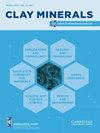Characterization and distribution of clay minerals in the soils of Fildes Peninsula and Ardley Island (King George Island, Maritime Antarctica)
IF 1.9
4区 地球科学
Q4 CHEMISTRY, PHYSICAL
引用次数: 1
Abstract
Abstract The environmental conditions in Maritime Antarctica are more favorable to soil development than in continental areas, which is reflected in the content and type of clay minerals present. In this context, soil clay minerals of Fildes Peninsula, South Shetland Islands were studied with the aim of relating them to periglacial and paraglacial processes as possible indicators of initial pedogenic processes. In this work, textural, mineralogical and crystallochemical characterization of clay minerals as well as chemical and physical soil analyses were carried out. The soil samples represented various surface cover types present on Fildes Peninsula. All samples were composed mainly of clay minerals, plagioclase, quartz and minor zeolites and pyroxene. The clay mineral content was very variable and reached up to 63% w/w. The clay minerals present are mainly smectite, vermiculite, chlorite and minor kaolinite, mica, corrensite and interstratified illite–smectite, with smectite and vermiculite dominating in almost all of the samples. The primary minerals display chemical alteration, and smectite formed by alteration of plagioclase. The clay mineral types were related to the parent material, which was affected by low-grade metamorphism and hydrothermal alteration that transformed biotite and chlorite into vermiculite via interstratified chlorite–vermiculite. Furthermore, this process and/or ongoing surface weathering transformed vermiculite into smectite. The genetic relationship observed between vermiculite and smectite suggests progressive alteration and transformation into a phase with intermediate composition between vermiculite and smectite. Therefore, vermiculite could be at least in part the smectite precursor. Samples closer to the current Collins Glacier front are composed mainly of vermiculite, with the greatest chemical variation occurring where the soils were developed from a mixture of initially glacially transported volcanic rocks through periglacial and fluvial processes. The clay minerals from the centre and south of Fildes Peninsula are mixtures of montmorillonite and vermiculite, as well as of chlorite and corrensite in various proportions. The clay minerals in soils developed on the west coast are a mixture of Fe-rich montmorillonite and vermiculite.Fildes半岛和Ardley岛(乔治王岛,南极洲海洋)土壤中粘土矿物的特征和分布
摘要南极海洋地区的环境条件比大陆地区更有利于土壤发育,这反映在粘土矿物的含量和类型上。在此背景下,研究了南设得兰群岛菲尔德斯半岛的土壤粘土矿物,目的是将其与冰缘和副冰川过程联系起来,作为初始成土过程的可能指标。在这项工作中,对粘土矿物进行了结构、矿物学和晶体化学表征,并对土壤进行了化学和物理分析。土壤样本代表了菲尔德斯半岛的各种地表覆盖类型。所有样品主要由粘土矿物、斜长石、石英以及少量沸石和辉石组成。粘土矿物含量变化很大,最高可达63%w/w。存在的粘土矿物主要为蒙脱石、蛭石、绿泥石和少量高岭石、云母、正方石和层间伊利石-蒙脱石,几乎所有样品中都以蒙脱石和蛭石为主。原生矿物表现为化学蚀变,蒙脱石由斜长石蚀变形成。粘土矿物类型与母材有关,母材受低级变质作用和热液蚀变的影响,热液蚀作用通过层间绿泥石-蛭石将黑云母和绿泥石转化为蛭石。此外,这个过程和/或正在进行的表面风化将蛭石转化为蒙脱石。在蛭石和蒙脱石之间观察到的遗传关系表明,蛭石和蒙脱石逐渐发生蚀变并转变为具有中等组成的相。因此,蛭石可能至少部分是蒙脱石的前驱体。靠近当前柯林斯冰川前缘的样本主要由蛭石组成,最大的化学变化发生在土壤由最初冰川搬运的火山岩混合物通过冰缘和河流过程形成的地方。菲尔德斯半岛中部和南部的粘土矿物是蒙脱石和蛭石的混合物,以及各种比例的绿泥石和柯石。西海岸发育的土壤中的粘土矿物是富含铁的蒙脱石和蛭石的混合物。
本文章由计算机程序翻译,如有差异,请以英文原文为准。
求助全文
约1分钟内获得全文
求助全文
来源期刊

Clay Minerals
地学-矿物学
CiteScore
3.00
自引率
20.00%
发文量
25
审稿时长
6 months
期刊介绍:
Clay Minerals is an international journal of mineral sciences, published four times a year, including research papers about clays, clay minerals and related materials, natural or synthetic. The journal includes papers on Earth processes soil science, geology/mineralogy, chemistry/material science, colloid/surface science, applied science and technology and health/ environment topics. The journal has an international editorial board with members from fifteen countries.
 求助内容:
求助内容: 应助结果提醒方式:
应助结果提醒方式:


